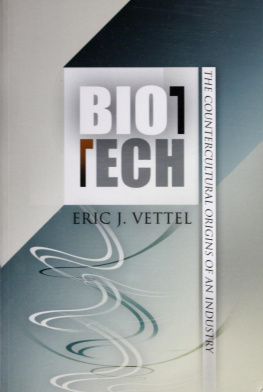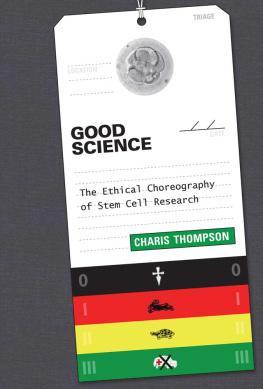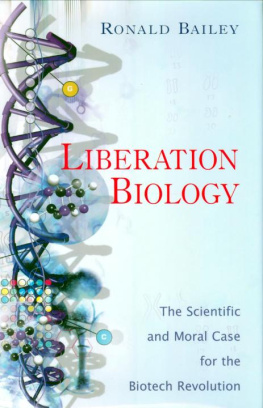Eric James Vettel - Biotech: The Countercultural Origins of an Industry
Here you can read online Eric James Vettel - Biotech: The Countercultural Origins of an Industry full text of the book (entire story) in english for free. Download pdf and epub, get meaning, cover and reviews about this ebook. City: Philadelphia, year: 2006, publisher: University of Pennsylvania Press, genre: Politics. Description of the work, (preface) as well as reviews are available. Best literature library LitArk.com created for fans of good reading and offers a wide selection of genres:
Romance novel
Science fiction
Adventure
Detective
Science
History
Home and family
Prose
Art
Politics
Computer
Non-fiction
Religion
Business
Children
Humor
Choose a favorite category and find really read worthwhile books. Enjoy immersion in the world of imagination, feel the emotions of the characters or learn something new for yourself, make an fascinating discovery.
- Book:Biotech: The Countercultural Origins of an Industry
- Author:
- Publisher:University of Pennsylvania Press
- Genre:
- Year:2006
- City:Philadelphia
- Rating:5 / 5
- Favourites:Add to favourites
- Your mark:
Biotech: The Countercultural Origins of an Industry: summary, description and annotation
We offer to read an annotation, description, summary or preface (depends on what the author of the book "Biotech: The Countercultural Origins of an Industry" wrote himself). If you haven't found the necessary information about the book — write in the comments, we will try to find it.
The seemingly unlimited reach of powerful biotechnologies and the attendant growth of the multibillion-dollar industry have raised difficult questions about the scientific discoveries, political assumptions, and cultural patterns that gave rise to for-profit biological research. Given such extraordinary stakes, a history of the commercial biotechnology industry must inquire far beyond the predictable attention to scientists, discovery, and corporate sales. It must pursue how something so complex as the biotechnology industry was born, poised to become both a vanguard for contemporary world capitalism and a focal point for polemic ethical debate.
In Biotech, Eric J. Vettel chronicles the story behind genetic engineering, recombinant DNA, cloning, and stem-cell research. It is a story about the meteoric rise of government support for scientific research during the Cold War, about activists and student protesters in the Vietnam era pressing for a new purpose in science, about politicians creating policy that alters the course of science, and also about the release of powerful entrepreneurial energies in universities and in venture capital that few realized existed. Most of all, it is a story about peoplenot just biologists but also followers and opponents who knew nothing about the biological sciences yet cared deeply about how biological research was done and how the resulting knowledge was used.
Vettel weaves together these stories to illustrate how the biotechnology industry was born in the San Francisco Bay area, examining the anomalies, ironies, and paradoxes that contributed to its rise. Culled from oral histories, university records, and private corporate archives, including Cetus, the worlds first biotechnology company, this compelling history shows how a cultural and political revolution in the 1960s resulted in a new scientific order: the practical application of biological knowledge supported by private investors expecting profitable returns eclipsed basic research supported by government agencies.
ReviewEric Vettel ably illuminates the political economy of science at the end of the 1960s, including the impact on attitudes among younger bioscientists of the demand for relevance in research; and he provides a riveting on-the-ground account of how in the Bay Area that response helped give birth to the regions biotechnology industry. This is a valuable book, deeply researched and altogether readable.Daniel Kevles, Yale University
The wide range of economic, social, cultural, and personal factors chronicled in the bookparticularly the interaction between the institutional and personalgives the reader a deep appreciation of the subtle and complex forces at work during this tumultuous period in U.S. history. . . . [Biotech] offers a provocative early look at an enterprise that is sure to receive much more scholarly analysis in the years to come.American Historical Review
Compelling, well-documented, and important. . . . [Biotech] helps us begin to see some of the complex questions that we will have to address in deciding how much and which basic research, applied science, and technological application we want.BioScience
This is one of those rare books. . . . What is passed over or hinted at in other histories is here explored in depth and with the skill that comes from a sympathetic familiarity with his subject and subjects. . . . The only history of the field I will keep and recommend.Nature Biotechnology
From the PublisherEric J. Vettel is the Bancroft Postdoctoral Fellow in United States History at the University of California, Berkeley, and Founding Executive Director of the Woodrow Wilson Presidential Library in Staunton Virginia.
Eric James Vettel: author's other books
Who wrote Biotech: The Countercultural Origins of an Industry? Find out the surname, the name of the author of the book and a list of all author's works by series.






